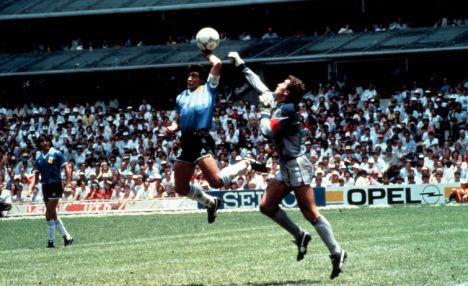Welcome to this blog, which I’m calling “The Invisible Hand of God.”
I’ll be writing here about the intersection of economics and soccer. The blog’s name combines “the invisible hand” (Adam Smith’s theory of how markets are governed) and “the hand of God” (the phrase soccer great Diego Maradona used to describe a notorious World Cup goal he scored against England in the 1986 World Cup)*.
Why economics and soccer?
In short: Because they’re critical subjects. And because I love them both.
Both economics and football play significant roles in most people’s lives, whether they think about it or not. Even for people who dislike business (or even numbers) and who can’t stand soccer (or even sports), the world is shaped by business and sporting factors. Money and resources matter to individuals, countries, political unions, and other groups of people. And — for the majority of the world’s population — so does soccer.
More people watch the World Cup every four years than any other sporting event. And at club level, more people cheer on their favorite professional sides globally than root for any other kinds of sports teams. Soccer is important the world over.
Here are two recent examples of how soccer and economics are intertwined in compelling ways.
In Spain, a financially ailing nation in the economically ailing Eurozone, unemployment is now at 25 percent. What does this mean for the financial future of the country’s domestic soccer league, which many consider to be the world’s best? What are the economic implications, in terms of financing and revenue from attendance, for Barcelona Football Club, the world’s best club team? What does the economic crisis mean for the Spanish national team, the reigning world and European champions?
Another example of how economics and soccer intermingle: In the last decade or so, very, very rich individuals have begun buying professional football clubs, especially those in the popular English Premier League. The latest such buyer is the UAE’s Sheikh Mansour bin Zayed Al Nahyan, who bought the once-mediocre Manchester City Football Club and invested three quarters of a billion dollars into the team. The team won the league last year and are among the favorites to win during this campaign. What does this kind of massive financial investment mean for entities, like Manchester City, that were until recently though of as being more akin to nonprofit organizations than corporations?
In future posts, I’ll be referencing several resources. One is the excellent 2009 book “Soccernomics,” by the journalist Simon Kuper and the economist Stefan Szymanski.
I’ll also be referring to soccer and economics journalism from mainstream media outlets like The New York Times and The Wall Street Journal, as well as soccer-specific sites like Soccernet and various blogs. And I’ll be aiming to tap the knowledge of the vibrant community of soccer players, pundits, and journalists on Twitter. Many of them are listed on my 106-member Twitter soccer list.
What do you make of all this? Do you have ideas you’d like me to explore? Think I’m full of it, or that this is intolerably boring stuff? Let me know in the comments.
*Apologies to all England fans.


Great topic Newley! I’m curious whether you follow U.S. sports closely as well too, and which — if any — of the major U.S. sports soccer most accurately mirrors, economically speaking? In terms of sheer magnitude and allure, I would think the NFL, although it appears on the surface that Euro soccer players have more latitude (or more propensity) to move around and have much higher earning power than top NFL players.
Thanks. Although I grew up playing baseball and basketball (in addition to soccer), I must admit I don’t follow MLB or the NBA (or the NFL, for that matter) very carefully these days. But I am aware of some of the economic models these leagues embrace. Indeed, some of the world’s biggest soccer players are big earners; I’ll have to look precisely at how they compare to NFL stars.
Very compelling topic–and I love the story behind the title of your blog. And it’s always fun to explore the unlikely/synergistic relationships between seemingly disparate subjects. Also, this reminds me of a recent study that linked India’s cricket performance with that of the stock market: http://ideas.repec.org/a/eee/pacfin/v18y2010i3p319-334.html
Thanks, Shruti, for the comment. And I appreciate the link to the India stock market/cricket piece. Interesting. Hadn’t seen that.
I have just about got over the title of the blog and the accompanying image, but love the topic Newley.
Will you be looking into the Financial Fair Play rules FIFA is to introduce? There has, to my knowledge, not been a clear explanation yet as to what they will practically mean for the major clubs around Europe. I know these new rules have the top English sides spooked. Chelsea dramatically reduced spending a couple of years ago, and this month posted its first ever profit under Roman Abramovic (despite several hugely expensive transfers this summer).
Having said that, some of the shockingly big sponsorship deals with companies also owned by club owners, seem to indicate clubs have found a way around it already.
Thanks, Pete. Ha ha, sorry about the title. 🙂
Yes, that’s a great idea: I will certainly look into FFP. Indeed, I’m somewhat unclear on what is specifically expected of clubs and what penalties/enforcement might entail. And yes, I’ll look into sponsorship deals. Interesting stuff.
Great Topic! It is interesting how league sports have transition or rather expanded from the Sports section to the Business section of newspapers.
The recent coverage of the Greek soccer team being sponsored by Adult Night Clubs brought to light the economic strains Greece is facing. This is definitely a case of economics have a causal effect on sport.
Indeed, Rajitha. I’d heard about the Greek soccer team’s…unique sponsorship. Will take another look at that issue. Thanks for the tip!